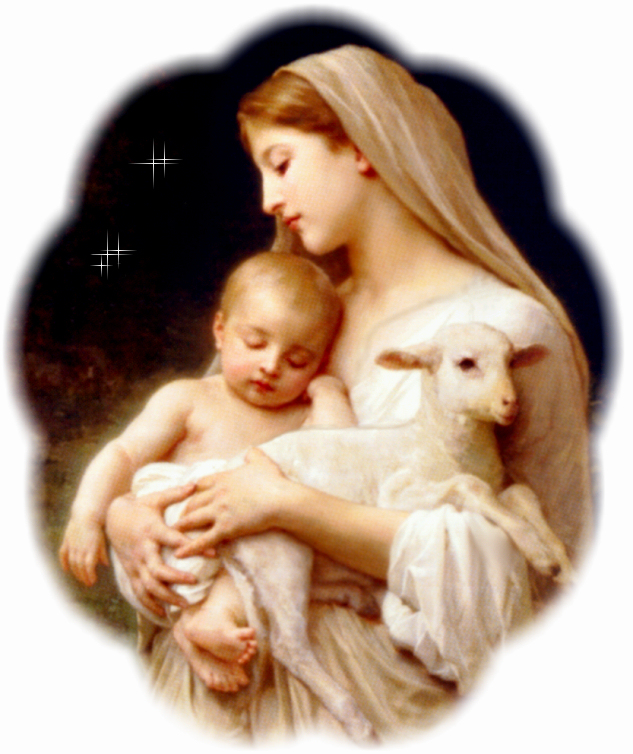|
|
  Devotion for the Dying [and the Holy Souls in Purgatory] MARY'S CALL TO HER LOVING CHILDREN  Chapter
8 All must imitate Mary.
Those who are not mothers according to the order of nature may, in a
certain
sense, be so according to the order of grace. There is what is called
spiritual
maternity. The Scripture says that "more are the children of the barren
than of her who hath a husband." You who are a virgin may yet be in a
spiritual
sense the "joyful mother of many children." If you are devoted to Mary,
if you have penetrated deeply into the recesses of her sweet Motherly
heart,
that incomparable Mother has shown you some of its secrets; but how few
there are who do this! What
great Saints would arise in God's Church if its members studied more to
imitate Mary; and to do this, we must bear her company and ask her
herself
to teach us to know her better, that we may better imitate her.
Mary-----Mother!
That is what strikes us as we turn to think of the sweet and wonderful
Conception of God in Mary. Mary might have been Immaculate and we
should
have loved and reverenced her and thanked God for preserving one out of
this fallen world free from The
slightest taint
of sin, but we should not have loved her, being simply a most holy
virgin, as we love our own Mother Mary, the Mother of our own dear Lord
Jesus, our Light, our Life, and our Love. No, in our present
state, as creatures of a sinful world, we could not have loved Mary as
our own dear Mother, whom we trust and love as an infant at its
mother's breast; we should not thus have loved our Mother if she had
not suffered and travailed for us and brought us forth in pain and
anguish at the foot of the Cross, where she joined her broken, pierced
heart to the Precious Blood shed upon that Cross for our salvation; and
that crushed, broken heart sent up its prayer in union with the
Precious Blood crying from the Cross, and the prayer of her heart was
one of pain and anguish, and the cry of the Precious Blood was the
utterance of intensest grief; The Precious Blood spoke words: "I
thirst!" The Mother's heart echoed, in unison: "Give me children or I
die!" The prayer of the God-Man and of the sinless Mother was answered.
The Holy Spirit was moved; the cry of the Precious Blood, the prayer of
the Mother's heart, was answered: Children were born to Mary. The Holy
Ghost had formed by Mary her First-born, Jesus. By the Precious Blood
and the cooperation of Mary, the Holy Spirit forms all the Elect. This
is according to the will of God. This will be continued in the Church
till the Day of Judgment. The Mother's Heart will ever plead. It
suffers not now, except on earth in her chosen ones, those who
voluntarily offer themselves to suffer in union with her and thus renew
her presence on earth. The Precious Blood
is ever mystically being shed and is the instrument by which the Holy
Spirit forms to Himself those who through the efficacy of that
outpoured stream of salvation are born to a new life. The Holy Spirit
overshadowed Mary, and by her formed Jesus, our Lord, our Chief, our
Head. So likewise, by the cooperation of Mary, the Holy Spirit forms
the elect of God, the heirs of Heaven. Mary is the exemplar, the type,
the model, of all motherhood. As the sinless Mother of the Incarnate
Word, Mary should not have been a suffering Mother; but as our Mother
she comes under the law by which, since the Fall of man, it has been
ordained that "a mother must bring forth her children in sorrow," in
pain and anguish. Pray for others as
you would for yourselves, for you are members of One Body, and thus
will you fulfill the command Our Lord has given, that you love one
another, and by this will all men know that you are His disciples. The
Saints prayed as though the sins of others were their own. St. Clare,
praying once for the conversion of a sinner, felt inwardly repulsed
from doing so, but she persevered, taking upon herself all the
punishment due to that sinner, and God was moved by her charity, and
the sinner was converted. See the charity which in the Old Law moved
Moses to pray that his name might be blotted out of the Book of God
rather than that his people should not be saved. Learn from the
example of Queen Esther, who exposed her life for her people, to save
them from death, the death of the body only. You may learn a lesson on
prayer from this holy Queen. King Assuerus, a mighty monarch, had put
away from him Queen Vasthi, on account of her disobedience, and had
chosen Esther in her place. King Assuerus had in his dominions a great
number of Jews, who were hated by one of the King's councilors, named
Aman, who was high in place and exalted above all the other princes.
Aman plotted their destruction, and having represented to the King that
they despised his ordinances, the King said to him, "Do with them as
seemeth best to thee." Aman then, calling in the King's scribes,
commanded them to write to all the King's lieutenants and to the judges
of the provinces and of divers nations, so that every nation should
read and hear according to their different languages. And the
messengers of King Assuerus were sent with these letters to all his
provinces, stating that it was the order of the King that all the Jews,
"both young and old, little children and women," should be destroyed.
Queen Esther, who was herself of the Jewish nation, "was asked to
petition the king that they may be saved; who knoweth [it was said to
her] whether thou art not come to the kingdom that thou mightest be
ready in such a time as this." It was the law of
the country that whosoever presented themselves within the King's inner
court without being called for should be put to death without reprieve.
Within that inner court, after a fast of three days and three nights,
did Queen Esther prepare to present herself. She put on her glorious
apparel, and thus in bright robes passed through the various doors of
the palace until she stood before the royal throne where the King sat,
clothed in his royal robes, glittering with gold and precious stones
and terrible to behold. King Assuerus lifted up his countenance and
looked upon Esther. She, in exceeding fear, turned pale, and utterly
abashed in his presence, spoke not to him; but he, "leaping down from
his royal throne, and caressing her, told her the law was not made for
her, but for others." She still remained silent, but the King, laying
his sceptre upon her neck, "kissed her, and asks her, Why dost thou not
speak to me? I am thy brother, fear not." She answered him, "I saw
thee, my lord-----and my heart was troubled for fear of
thy majesty, for thou, my lord, art very admirable, and thy face is
full of graces." And the King said to her, "What wilt thou, Queen
Esther? What is thy request? If thou shouldst even ask one-half of the
kingdom, it shall be given to thee." But she answered, "If it please
the King, I beseech thee to come to me this day." That day, after the
King had banqueted with her, he said to her again, "What dost thou
desire should be given thee? And for what thing askest thou? Although
thou shouldst ask the half of my kingdom, thou shalt have it." Again
did the King banquet with the Queen and say to her, "What is thy
petition, Esther, that it may be granted thee, and what wilt thou have
done?" Then she answered, "If I have found favor in thy sight, O King,
and if it please thee, give me my life for which I ask, and my people
for which I request. For we are given up, I and my people, to be
destroyed, to be slain, and to perish-----we have an enemy whose
cruelty redoundeth upon the king," and she told him that this wicked
enemy was Aman. Then the King
commanded that he should be hanged upon a high gibbet. Queen Esther,
not content while the decrees were still in force, fell down at the
King's feet and wept, and speaking to him, besought him that he would
give orders that the malice of Aman and the wicked devices he had
invented against the Jews should be of no effect. And he held out the
golden sceptre with his hand, which was the sign of clemency, and she
arose up and stood before him and said, "If it please the king, I
beseech thee that the former letters of Aman, the enemy of the Jews,
may be reversed by new letters, for how can I endure the murdering and
slaughtering of my people?" Now, we might very well and with much profit draw out the comparison which the Scripture here gives us of Queen Esther and our Blessed Lady, of Queen Vasthi's disobedience and the disobedience of Eve. In Aman's hatred of the Jews we may see the hatred of the devil for God's people, and in the defeat of his plots and final overthrow by Queen Esther, we may see still more clearly the analogy with Mary, through whom the serpent's head is crushed. We might increase our love for our Mother, the Queen of Heaven, by meditating upon the beautiful book of Esther and applying it to her in the way I have said. And, fancying we hear her voice pleading for us at the throne of the great King, "How can I endure the slaughtering of my people?" then to us a new light perhaps arises, and we may rejoice with a great joy as we remember how God through her has turned our days of sadness and mourning into gladness and rejoicing. But the histories in the Scriptures give us many lessons, and I wish you now to apply to your own soul the conduct of Queen Esther and learn first-----that the most essential thing required by God to make our prayer acceptable to Him -----before we appear in His presence-----is penance. Observe the fast of Queen Esther, and strive to acquire a penitential spirit, a deep sorrow for having displeased God, who is so good, so very good. Esther puts on her glorious apparel, so must you adorn your soul with the garment of charity, the glittering robe of the love of God, and thus attired appear before the King of kings. What should be your behavior before Him? What has it been in the past? Too often, far too often, it has been an unbecoming levity of manner, an exuberance of speech almost amounting to disrespect-----or at least, far greater attention to what you have to say than attention to the Presence of the great God who holds your life in His hands, who "can cast both body and soul into Hell." What did Queen Esther do in the presence of King Assuerus? She remained silent, fearing with an exceeding great fear. It was then that the King, putting off his majesty, came down from his throne and caressed her. She still remained silent; he told her to fear not, for he was her brother, and he kissed her. Christian soul, if you would have your God put off His Majesty and come down from His lofty throne to embrace you, learn from this example-----which is meant for your instruction-----the reverence you owe in the presence of His Majesty. It is to the souls who abase themselves before Him with the lowliest reverence, it is to these that God condescends with most familiar love. It is to the souls that feel utterly crushed and unworthy to be in His sight that he gives His favors, these that He caresses and comforts, telling them to fear not, for He is their brother. It is then that the soul, looking up, as Queen Esther did, may murmur, "I saw Thee, my Lord, and my heart was troubled for fear of Thy Majesty, for Thou, my God, art very admirable, and Thy face is full of graces." Will God do less than the earthly king? No. He will whisper to the delighted soul, "What wilt thou, My dove, My beautiful one? What is thy request? If thou shouldst even ask one-half of My kingdom, it shall be given to thee." ["He who gave His only-begotten Son, how has He not, with Him, also given us all things."] Then will you ask Him for Himself, for a closer union with Him, and He will sup with you, and in that banquet between the soul and God He will ask again: What is thy petition, that it may be granted thee? "Ask, and you shall receive, that your joy may be full." It is then, indeed, while you are in that wonderful union with God, with Jesus who made Himself your brother-----it is at the Sacred Banquet where He unites Himself so closely to you-----it is then that you may ask whatever you will, and it shall be done unto you. Souls, spouses of God, why will you not exercise your power over the Heart of your Lord? Why will you not beseech Him? Why will you not, falling at His feet, weeping, entreat that your people, your brethren, may be spared? Satan's wiles beguile thousands at all hours of the day and night-----thousands of souls are being destroyed, are being slain, are perishing-----and you go to meet your God, to enjoy the sweetness of His presence, to receive the whispers of His Holy Spirit, to receive the Meat and Drink which is the nourishment, the very life of your soul, to receive good things from the hand of God for yourself, and forget that the one reason for which you are thus exalted is that you fulfill the law, and that love is the fulfilling of the law. The first command of the law is to love God above all things, but the second is like to it, and that is, to love your neighbor as yourself. Could you say you loved your neighbor as yourself if you saw him dying alone, uncared for, and did not assist him? Could you see him most cruelly slaughtered without an attempt to save him? All over the world souls are dying, are perishing, are falling into the bottomless abyss from which there is no redemption. Before it is too late, will you not raise one cry to Heaven for mercy ere the final sentence is pronounced, ere the awful words, "Depart from Me, ye cursed," have been spoken to that then most miserable soul? God has purposely left to you a part of the work of saving souls. It is to His glory that you should imitate His Son, in whom He is well pleased, that you should become like to Jesus, that you should do the work He did, that you should be filled with His love for souls, that you should be ready to lay down your life for them. Jesus does not require that you should die for them, but rather that you should live for them, and offer to the Eternal Father His own Passion, His own most holy Life and Death, which He has put into your hands to do with as you please. Jesus has given you this power, that by your cooperation with Him in the saving of souls you may the more resemble Him, and that He may live again in His Members, and that God, looking from Heaven, may see upon this earth living copies of Jesus, Jesus multiplied in His Members, and thus more pleasing will this earth appear to Him than when in the beginning He looked upon it and was pleased and pronounced it good. Your prayer should be as earnest for others as for yourself: "Our Father . . . forgive us our trespasses . . . deliver us from evil . . ." as you were taught by Our Lord Himself to say. Ah, if you had the love of God in you that the Saints had, you would sorrow over the offences committed against Him as though you had yourself committed them; you would pray for sinners as though you had yourself been guilty of their sins. Open the book of Queen Esther, from which I have already drawn one example for your instruction. Read the prayer she made to God for her people. You will find that though that holy queen could say to God, "Thy handmaid hath never rejoiced since I was brought unto this day but in Thee, O Lord, the God of Abraham," nevertheless she takes the sins of her people upon herself, saying, "We have sinned in Thy sight, and therefore Thou hast delivered us into the hands of our enemies. For we have worshipped their god; Thou art just, O Lord."  Contact
Us Contact
Us HOME--------------CATHOLIC CLASSICS--------------PRAYER INDEX www.catholictradition.org/Classics/holy-souls8.htm |